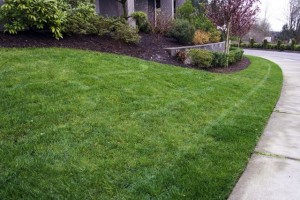Natural Lawn Care and Landscape Maintenance
Ecoyards provides full service lawn care and landscape maintenance services in Seattle and Mercer Island. Please use our Contact Form to setup a consultation. We’ll evaluate your property and review your preferences to create maintenance plan to keep things clean, safe, and attractive year round.
Our natural lawn care program includes practices such as: mulch-mowing (leaving the chopped-up grass to return nutrients to your lawn); mowing high to encourage deeper roots and crowd out weeds; and avoiding the use of pesticides and synthetic fertilizers. Our landscape maintenance programs include periodic weeding and fertilizing; driveway and path maintenance; shrub and small tree pruning; snow removal; and mulching of landscape beds.
Our recommended lawn care practices include:
- Mulch-mowing, also called “grasscycling.”
- Mowing regularly (remove only 1/3 of grass height each time), and mowing a little higher, at 2 inches on most lawns.
- Avoiding over-watering: watering deeply, to moisten the whole root zone, but infrequently, to limit disease and build deeper roots; and watering dormant lawns at least once a month during the dry season, to improve post-drought recovery. Ecoyards’ irrigation services team can help you maintain, retrofit, and adjust your existing irrigation systems following the US EPA Water Sense guidelines.
- Setting realistic expectations for lawn appearance, and tolerating a few weeds.
- Moderate fertilization with natural slow-release fertilizers, to build soil nutrient reserves and biodiversity.
We follow an integrated approach to pest problems (weeds, insects, and diseases) that includes:
- Correctly identifying the cause of the problem.
- Understanding the biology of the pest organism and its natural predators.
- Setting realistic thresholds of acceptable damage from pests.
- Monitoring for pest problems at appropriate times of the year.
- Treatment of over-threshold problems with methods that support the turfgrass ecosystem and have the least non-target impacts on beneficial soil organisms, wildlife, pets, or humans.
- Repeated broadcast or calendar-based applications of pesticides should be avoided because they may damage the diversity and stability of the grass/soil ecosystem.
For more information on our approach to maintenance services, be sure to read our blog post categories related to natural lawn care and landscape maintenance services.




